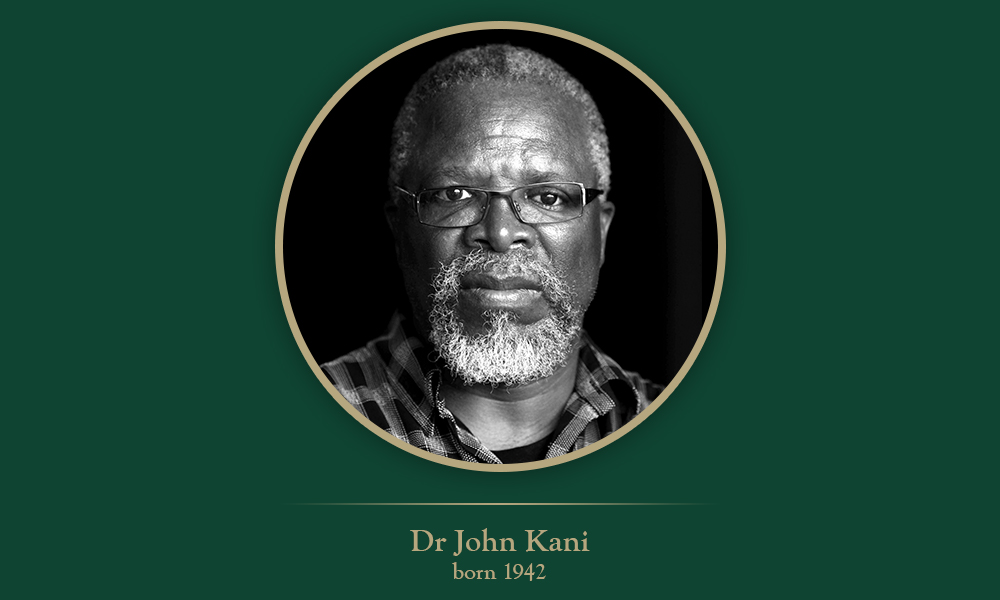
Old is Gold: Dr John Kani
In March this year, Dr John Kani’s masterpiece, Kunene and the King, opened at the Royal Shakespeare Theatre, Stratford-Upon-Avon. Featuring just two actors, Kani as a nurse, and fellow South African theatre legend, Sir Anthony Sher as an actor coming to terms with terminal liver cancer, the play, which “…examines South Africa’s relationship with its traumatic past and complex, challenging present and future,” (Sam Marlowe, The Times) has received critical acclaim:
“John Kani beautifully captures the complex divides of race, class and politics in a remarkable and moving new play” – Michael Billington, The Guardian
“Kani’s writing remains deeply incisive, full of both anger and understanding…” Dave Fargnoli, The Stage
Kani conceived his latest work in 2009, after working with Sher in The Tempest and eventually found the time to write it last year at the age of 75. Only the third solo work from this iconic South African actor, writer and director, it has just enjoyed a successful run at The Fugard Theatre in Cape Town.
Given his age, many might imagine this to be Kani’s last gift to the world of theatre, but considering that he is a man not only of phenomenal talent, but of incredible energy and capacity too – and the fact that he has good genes on his side (his grandfather died at the impressive age of 101) – it’s likely that we can expect much more from this iconic South African figure who has changed the face of South African theatre.
Born Bonisile John Kani on 30 August 1942 in New Brighton, Port Elizabeth, Kani’s love of the stage manifested early on and by the time he reached Newell High School he was a regular in its school productions – alongside actor and playwright, Winston Ntshona. After matriculating, Kani continued to pursue his passion, joining several drama groups, including the Serpent Players – so-called because this group of actors performed in a disused snake pit at an old zoo in Port Elizabeth.
“We were more than just a drama group. We were soldiers on stage. We used art to speak out against injustices.”
It was during these years that Kani met another South African theatre legend, Athol Fugard, a meeting that was to have a profound impact on his career. Just a few years later, he was performing Sizwe Banzi is Dead (1972) and then The Island (1973) both of which he co-authored with Athol Fugard and Winston Ntshona, and for which he and Ntshona received a joint Tony award for Best Actor after performing these productions on Broadway and Down Under.
It was perhaps inevitable, given the fact that the Apartheid regime was at its peak, that Kani’s involvement in protest theatre would have ramifications for the actor. They started when he and Ntshona were detained while performing in the rural areas of South Africa. Tragically, it didn’t end there. In 1982, when Kani’s character in Miss Julie kissed a white woman on stage, half the audience left in protest and Kani received many death threats and survived an assassination attempt. He also lost his left eye during an encounter with the police and has had to wear a glass prosthetic ever since.
Over the course of his long and illustrious career, Kani has been the sole playwright of three plays – Nothing But the Truth (2002), Missing (2014) and Kunene and the King (2019) – starred in several movies including Saturday Night at the Palace (1987), An African Dream (1987), A Dry White Season (1989) and Sarafina! (1992), and co-founded the Market Theatre Laboratory, “the educational arm of the world famous Market Theatre”, with Barney Simon. This highly respected institution “trained exceptional performers and theatre-makers” and “has been recognised on multiple platforms for creating excellent theatre that engages with human rights issues.” (Marketlab.co.za)
His list of awards is long and prestigious and includes the Hiroshima Peace Culture Foundation Award (2000), an Obie Award (2003) for his contribution to theatre, The Order of Ikhamanga Silver for “Excellent contributions to theatre and, through this, the struggle for a non-racial, non-sexist and democratic South Africa,” (2005), the Olive Schreiner Prize (2005) anda Lifetime Achievement Award at the South African Film and Television Awards (2010). He is the recipient of two honorary doctorates, one from the University of Cape Town (2006) and another from Nelson Mandela Metropolitan University (2013). But, as Kani explains, “The highest accolade I’ve ever received was – 3 months before his death – when my father introduced me as an actor.”
And if you thought that was an impressive list of achievements for a man in his 70s, it doesn’t end there. In 2016, Kani played King T’Chaka of Wakanda in Captain America: Civil War and in 2018 he was back in the same role in Black Panther – Kani was responsible for introducing isiXhosa as the language spoken in Wakanda. And later this year, Kani will thrill audiences once again as the voice of Rafiki in Disney’s 2019 remake of The Lion King.
“Until I find the answer to restore humanity, only then can I say I achieved what I needed to.”
Sources:



